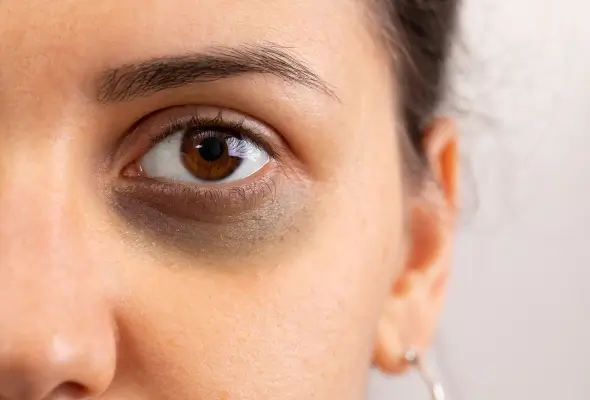-
Doctors
-
Specialities & Treatments
Centre of Excellence
Specialties
Treatments and Procedures
Hospitals & Directions HyderabadCARE Hospitals, Banjara Hills CARE Outpatient Centre, Banjara Hills CARE Hospitals, HITEC City CARE Hospitals, Nampally Gurunanak CARE Hospitals, Musheerabad CARE Hospitals Outpatient Centre, HITEC City CARE Hospitals, Malakpet
HyderabadCARE Hospitals, Banjara Hills CARE Outpatient Centre, Banjara Hills CARE Hospitals, HITEC City CARE Hospitals, Nampally Gurunanak CARE Hospitals, Musheerabad CARE Hospitals Outpatient Centre, HITEC City CARE Hospitals, Malakpet Raipur
Raipur
 Bhubaneswar
Bhubaneswar Visakhapatnam
Visakhapatnam
 Nagpur
Nagpur
 Indore
Indore
 Chh. Sambhajinagar
Chh. SambhajinagarClinics & Medical Centers
Book an AppointmentContact Us
Online Lab Reports
Book an Appointment
Consult Super-Specialist Doctors at CARE Hospitals

Black Eye
Symptom, Causes, Diagnosis and Treatment
Black Eye
A black eye is a common injury that can happen to anyone. While often associated with physical altercations, black eyes can result from various accidents or medical conditions. This blog explores the potential black eye causes, symptoms, and treatment of black eyes. We will look at why they happen, how to spot them, and what you can do to make them better quickly. We'll also discuss when it is essential to see a doctor and share tips to help prevent black eyes from happening in the first place.

What is a Black Eye?
A black eye, or periorbital haematoma, is a common injury that affects the area surrounding the eye. It occurs when the small blood vessels in the skin around the eye break. Despite its name, a black eye typically involves the face rather than the eye itself. The medical term for this type of bruising is ecchymosis.
Symptoms of Black Eye
A black eye typically presents with distinct symptoms that develop over time, such as:
- Discolouration: Initially, the area around the eye may appear red and swollen. As blood vessels burst beneath the skin, bruising begins to form, causing the characteristic dark discolouration associated with a black eye. The bruising usually starts in a deep purple or blue colour. Over a few days, it may change to green or yellow before gradually fading.
- Swelling: The affected area may become puffy, making it difficult to open the eye fully. This swelling can also cause temporary blurred vision and discomfort when moving the eye.
- Subconjunctival Haemorrhage: A black eye may be accompanied by a subconjunctival haemorrhage, where the white part of the eye turns bright red due to bleeding on the surface. While this may look alarming, it is usually painless and clears up within about two weeks.
Other symptoms may include:
- Pain or tenderness around the eye
- Headache
- Difficulty focusing
Causes and Risk Factors of Black Eye
A black eye typically occurs when something strikes a person in the face. This could be a ball, a fist, a door, or an object. Common causes of black eyes include:
- Eye injuries or trauma include a knock, hit, or impact.
- Accidents, assaults, contact during sports, or walking into something.
- Facial surgery, such as cosmetic procedures or nasal operations, can lead to black eyes.
- Dental work, including wisdom tooth removal or implant placement, may cause discolouration around one or both eyes.
- This happens when blood and other fluids from the surgery spread under the facial tissues and into the eye area.
- A fracture deep inside the skull can result in 'raccoon eyes', even without direct injury to the eye area.
- Certain health conditions like amyloidosis, autoimmune diseases such as lupus, and some cancers can also cause black eyes.
- Other potential causes include concussions, haemophilia, sinus infections, and certain liver conditions.
Complications
While a black eye is often a minor injury that heals on its own, it can sometimes be a symptom of serious underlying issues. In some cases, complications may arise if the cause of the black eye is not properly treated. Here are some common complications of black eye:
- Vision Issues: If left untreated, a black eye can lead to blindness in extreme cases.
- Brain-related Complications: These may include brain bleeding or infection, which can be life-threatening if not addressed promptly.
- Other Potential Complications: These include facial deformity, paralysis, and hearing loss. There's also a risk of developing meningitis.
Diagnosis
Diagnosing a black eye typically involves a straightforward process. In many cases, if you have a single black eye following a blow to your face without other symptoms, you can often diagnose it yourself.
Physical Assessment: Doctors will perform a physical examination to assess the extent of the injury. The doctor will check your vision and evaluate how well your eyes can move. They will examine your eyes closely and use a light to observe how your pupils dilate, which helps determine if there's any damage to the eye itself. The examination may also include an assessment of your facial and orbital bones to check for any fractures.
If the doctor suspects a more serious injury or the presence of a foreign object in your eye, they might recommend further tests such as:
- X-rays
- Ultrasounds
- CT scans
If necessary, your doctor may refer you to an optometrist or ophthalmologist for more specialised care and treatment of your black eye.
Treatment for Black Eye
Black eye treatment typically involves simple home remedies for medical management. These include:
- Cold Compress: Wrap ice cubes or frozen peas in a clean towel and gently hold it against the eye (don't put pressure) for 10 to 20 minutes. Repeat this process regularly during the first 24 to 48 hours after the injury.
- Warm Compresses: After 48 hours, switch to a warm compress. These help increase blood flow to the area. Apply a warm, not hot, cloth to the eye area for about 20 minutes at a time.
- Rest and Elevation: Elevating the head when lying down can prevent fluid accumulation and reduce swelling.
- Over-the-counter Pain Relievers: Pain reducing medicines can help manage pain.
- Management of Underlying Issue: Doctors may provide suitable treatment options if an underlying situation causes a black eye. These may include removing foreign objects, fracture management, medications, and management of systemic diseases.
When to See a Doctor
While a black eye often heals on its own, there are situations where medical attention is necessary. Seek immediate medical help:
- If your black eye doesn't improve within three weeks
- If you experience persistent headaches, blurred vision
- If the area around your eye becomes warm or starts leaking pus.
- If you have a high temperature or feel hot and shivery
- If you notice blood in your eye, have an irregularly shaped pupil, or experience vision problems like double vision or seeing flashing lights.
- If you've had a blow to the head and have bruising around both eyes, lost consciousness, or been sick.
Prevention
Preventing a black eye involves taking precautionary measures to protect your eyes and face from potential injuries. These include:
- Wear protective eyewear during activities that could lead to eye injuries. This includes sports like baseball, basketball, and martial arts, as well as occupational tasks such as gardening, woodwork, and metalwork.
- Taking steps to prevent accidents at home can significantly reduce the chances of getting a black eye. Secure rugs and carpets to avoid tripping, remove clutter and other trip hazards, and ensure areas around the home and garden are well-lit.
- When travelling by car, always wear your seat belt.
Conclusion
Prevention plays a key role in avoiding black eyes. Taking simple precautions like wearing protective gear during sports and removing hazards at home can lower the risk of eye injuries. Remember, most black eyes heal on their own within a few weeks, but it is always better to be safe than sorry when it comes to our eyes. If in doubt, don't hesitate to consult a doctor.
FAQs
1. How do I heal a black eye faster?
While a black eye typically heals on its own within two to three weeks, there are ways to speed up the process. Apply an ice pack wrapped in a cotton cloth to the affected eye for 10 to 20 minutes every hour during the first 24 to 48 hours. After this period, switch to warm compresses to increase blood flow. Elevating your head when lying down and OTC pain relievers also help.
2. How long does a black eye take to form?
A black eye doesn't always appear immediately after an injury. Initially, the area might look red and swollen. The characteristic dark discolouration typically develops over the next 24 to 48 hours as blood pools under the skin.
3. Is black eye safe?
In most cases, a black eye is not dangerous and will heal on its own. However, it can sometimes indicate a more serious injury, mainly if it results from significant trauma to the face or head.
4. When to worry about a black eye?
Seek medical guidance if you experience persistent headaches, blurred vision or if the area becomes warm or starts leaking pus. Also, consult a doctor if the black eye doesn't improve within three weeks or if you have vision problems, severe pain, or signs of infection.
5. How long does eye black last?
A black eye typically lasts for about two to three weeks. During this time, the bruise will change colour as it heals, starting from deep purple or blue and gradually fading to green or yellow before disappearing completely.
Still Have a Question?




